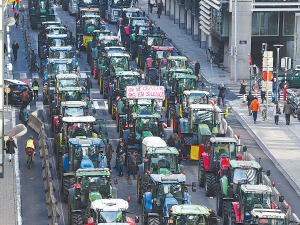EU trade deal signed
Planning is already underway to make exporters aware of the opportunities of the recently signed free trade agreement between NZ and the EU.
 Farmer protests across the 27-nation EU have brought traffic to a standstill in capitals from Berlin to Paris, Brussels and Rome.
Farmer protests across the 27-nation EU have brought traffic to a standstill in capitals from Berlin to Paris, Brussels and Rome.
Hundreds of tractors gathered on Brussels' Luxembourg Square in the Belgian capital in early February.
On the Paris-Brussels motorway, angry farmers wrote in huge yellow letters, visible from afar: "Ursula, we are here!" It was chalked on the road with equal parts defiance and desperation, warning European Commission head Ursula von der Leyen not to ignore farmers' please for better prices and less bureaucracy.
Farmers hit the Belgian capital to call on European leaders to put an end to free trade agreements between the European Union and third countries. They want a review of agreements such as Mercosur, for imports to be subject to the sae rules as European agricultural products, and for the "costly" bureaucracy of agricultural and environmental regulation to be made more flexible and simplified.
So why are EU farmers protesting now?
Over the past two years, the problems facing farmers have reached critical mass.
Droughts, fires and floods blamed on climate change devastated crops. The Covid-19 pandemic hit the economy. Russia's war in Ukraine sent energy prices soaring. There was runaway inflation, with agricultural products often unable to keep pace.
"European farmers have been under increasing pressure from many sides," said European Commission vice-president Maros Sefcovic. He said that in southern Spain, some water reservoirs were at only 4% capacity.
Forest fires have wiped out around 20% of Greece's annual agricultural income. "The value of grain production fell by 30% last year - from €80 billion to less than €60 billion."
The rallies are part of farm protests across the 27-nation EU that have shown how just a few hundred tractors can bring traffic to a standstill in capitals from Berlin to Paris, Brussels and Rome.
Millions of people across the EU have faced disruption and struggled to get to work or had doctor's appointments cancelled because protests blocked their way.
"It is important that we listen to them," said Belgian Prime Minister Alexander De Croo. They face huge challenges from adapting to climate change to tackling pollution, he said.
The European Commission has announced plans to protect farmers from Ukraine's cheap war exports. These still need to be approved by the EU's 27 member states and the European Parliament but represent a sudden and symbolic concession.
French Farmers Call Off Blockades
France's two major farmers unions, last week, suspended protests and lifted road blockades across the country.
The move came shortly after the French prime minister unveiled a new set of measures they see as "tangible progress".
Farmers have been protesting for days across the country to denounce low wages, heavy regulation and unfair competition from abroad.
The president of the Young Farmers union, Armaud Gaillot, spoke alongside the head of France's biggest farmers union FNSEA.
"We call on our members to suspend the blockades."
FNSEA chief Arnaud Rousseau said they had been heard on a number of points, "including emergency measures to financially support struggling farmers and wine producers".
Earlier, Prime Minister Gabriel Attal announced a new set of measures, coming on top of other promises made in recent days. His speech came as convoys with hundreds of angry farmers driving heavy-duty tractors created chaos outside the European Union's headquarters, demanding leaders at an EU summit provide relief from rising prices and bureaucracy.
"The question is currently being asked throughout Europe: is there a future for out agriculture? Of course, the answer is yes," Attal said.
To celebrate the tenth anniversary of its annual Good Deeds competition, Rabobank will give away $100,000 to improve rural community hubs, schools, clubrooms, and marae across New Zealand.
Agricultural and veterinary product supplier Shoof International has appointed Michaela Dumper as its new chief executive.
Federated Farmers is celebrating following the Government's announcement that young farmers will be able to use their KiwiSaver funds to buy their first home or farm.
The Meat Industry Association of New Zealand (MIA) today announced that Chief Executive Officer Sirma Karapeeva has resigned from the role.
The winners of the 2026 Hawke’s Bay/Wairarapa Dairy Industry Awards were announced at the annual awards dinner held at Copthorne Solway Park in Masterton on Thursday evening.
Environment Southland is welcoming this week’s decision by the Environmental Protection Authority (EPA) to approve the release of Blaptea elguetai, a leaf‑feeding beetle that will help control the highly invasive Chilean flame creeper.

OPINION: A mate of yours truly reckons rural Manawatu families are the latest to suffer under what he calls the…
OPINION: If old Winston Peters thinks building trade relations with new nations, such as India, isn't a necessary investment in…